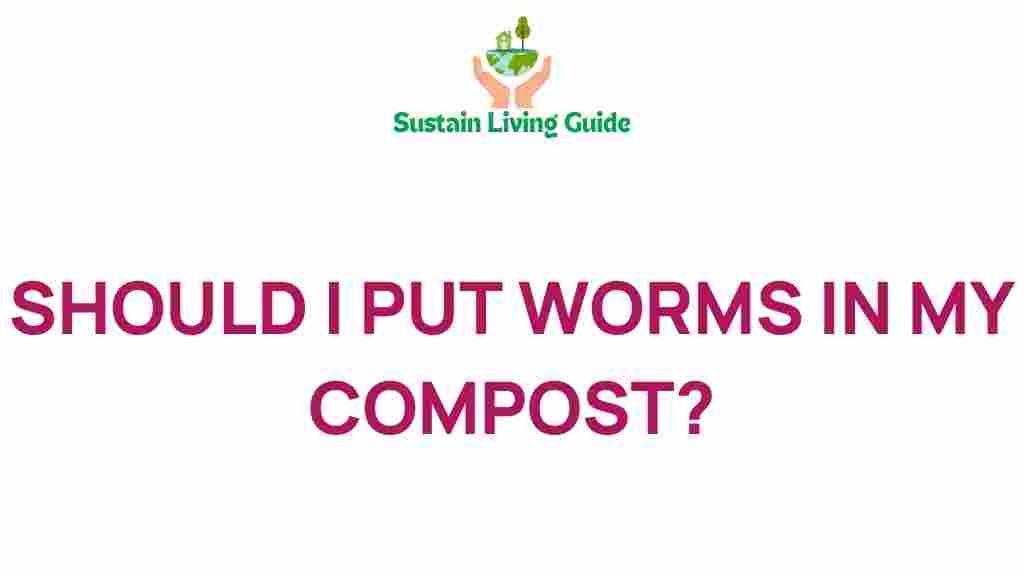The Surprising Benefits of Adding Worms to Your Compost Pile
Composting is an eco-friendly way to recycle organic waste, reduce landfill contributions, and create nutrient-rich soil for your garden. But did you know that adding worms to your compost pile can significantly enhance the process? This article delves into the surprising benefits of incorporating worms into your compost routine, making your composting experience not only easier but also more productive.
Understanding Composting
Composting is the natural decomposition of organic matter, such as food scraps and yard waste, into a rich soil amendment known as compost. This process involves microorganisms, insects, and, as we will explore, earthworms. By understanding composting, you can appreciate how worms play a crucial role in this ecosystem.
Why Add Worms to Your Compost Pile?
Worms, particularly red wigglers (Eisenia fetida), are often referred to as nature’s recyclers. Here are several surprising benefits of adding worms to your compost pile:
- Accelerated Decomposition: Worms help speed up the breakdown of organic materials, resulting in faster compost production.
- Nutrient-Rich Castings: Worm castings are a potent natural fertilizer, rich in nutrients essential for plant growth.
- Improved Soil Structure: The addition of worm castings enhances soil aeration and water retention.
- Enhanced Microbial Activity: Worms stimulate beneficial microbial activity, which helps in the composting process.
- Less Odor: Worms break down waste effectively, reducing unpleasant odors associated with traditional composting methods.
How to Start a Worm Composting System
Starting a worm composting system, also known as vermicomposting, is straightforward. Follow these steps to set up your worm-inclusive compost pile:
Step 1: Choose the Right Worms
For composting, red wigglers are the best choice. They thrive in decomposing organic matter and are efficient at converting waste into nutrient-rich castings.
Step 2: Prepare Your Compost Pile
Before introducing worms, ensure your compost pile is ready. Aim for a mix of green materials (nitrogen-rich) and brown materials (carbon-rich). Here’s a simple ratio to follow:
- 3 parts brown materials (e.g., dried leaves, cardboard)
- 1 part green materials (e.g., vegetable scraps, grass clippings)
Step 3: Create a Bedding Layer
Worms need a comfortable environment to thrive. Create a bedding layer using shredded newspaper, cardboard, or coconut coir. Moisten the bedding slightly before adding the worms.
Step 4: Introduce the Worms
Once your bedding is prepared and the compost pile is established, add your red wigglers. A good rule of thumb is to use about one pound of worms for every pound of food scraps generated weekly.
Step 5: Maintain the Compost Pile
To keep your worm composting system healthy, regularly check moisture levels, aerate the pile, and add new organic materials. Avoid adding citrus peels, onions, and garlic, as these can be harmful to worms.
Maintaining Your Worm Composting System
Effective maintenance of your worm composting system ensures a steady supply of high-quality compost. Here are some tips:
- Moisture Control: The compost should feel like a damp sponge. If it’s too dry, add water; if too wet, add dry materials like shredded paper.
- Aeration: Occasionally turning the pile helps aerate and prevents compacting.
- Feeding Schedule: Feed the worms every few weeks, but avoid overfeeding to prevent odors.
Troubleshooting Common Issues
Even with careful management, you may encounter some challenges. Here are common issues and solutions:
- Odor Problems: If you notice a foul smell, it may be due to overfeeding or excess moisture. Reduce feeding and aerate the pile.
- Worm Migration: If worms are trying to escape, it could be too dry or too wet. Adjust moisture levels accordingly.
- Pests: Keep an eye out for pests. If you spot fruit flies or other insects, ensure you’re not adding contaminated food scraps.
Benefits of Worm Compost for Your Garden
Using worm compost in your garden can lead to remarkable benefits:
- Improved Plant Growth: The nutrients in worm castings promote healthier plants.
- Enhanced Disease Resistance: Worm compost can help plants resist diseases and pests.
- Soil Enrichment: Regular use of worm compost enriches soil quality over time.
Conclusion
Adding worms to your compost pile is a game-changer for anyone looking to enhance their composting efforts. The benefits are numerous, from accelerated decomposition and nutrient-rich castings to improved soil structure and reduced odor. By following the steps outlined in this article, you can create a thriving worm composting system that not only helps the environment but also enriches your garden.
For more information on composting and gardening, check out our comprehensive composting guide. And remember, when it comes to gardening, every little bit helps, so why not make the most out of your organic waste?
For additional resources on worm composting, visit this informative article.
This article is in the category Eco-friendly and created by SustainLivingGuide Team
